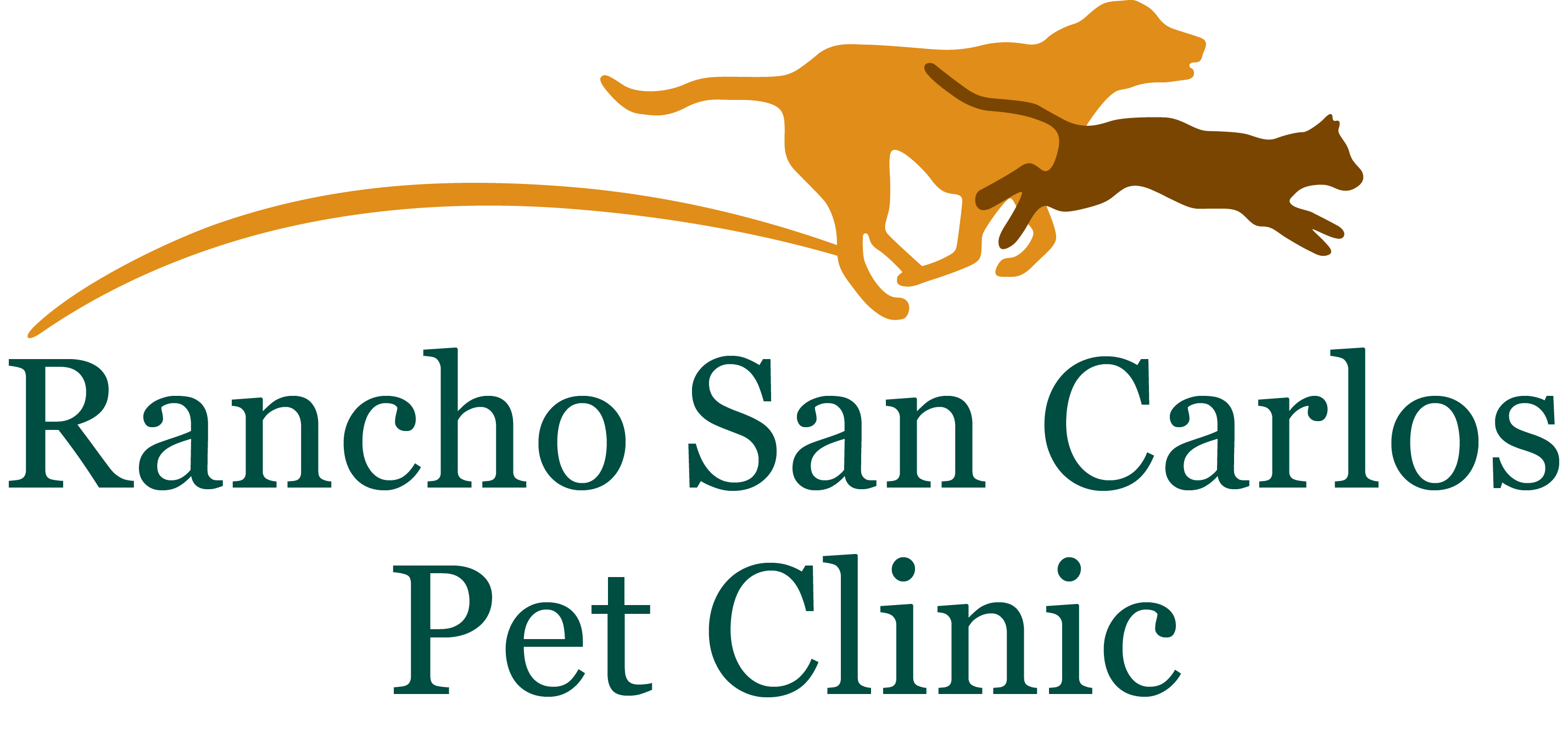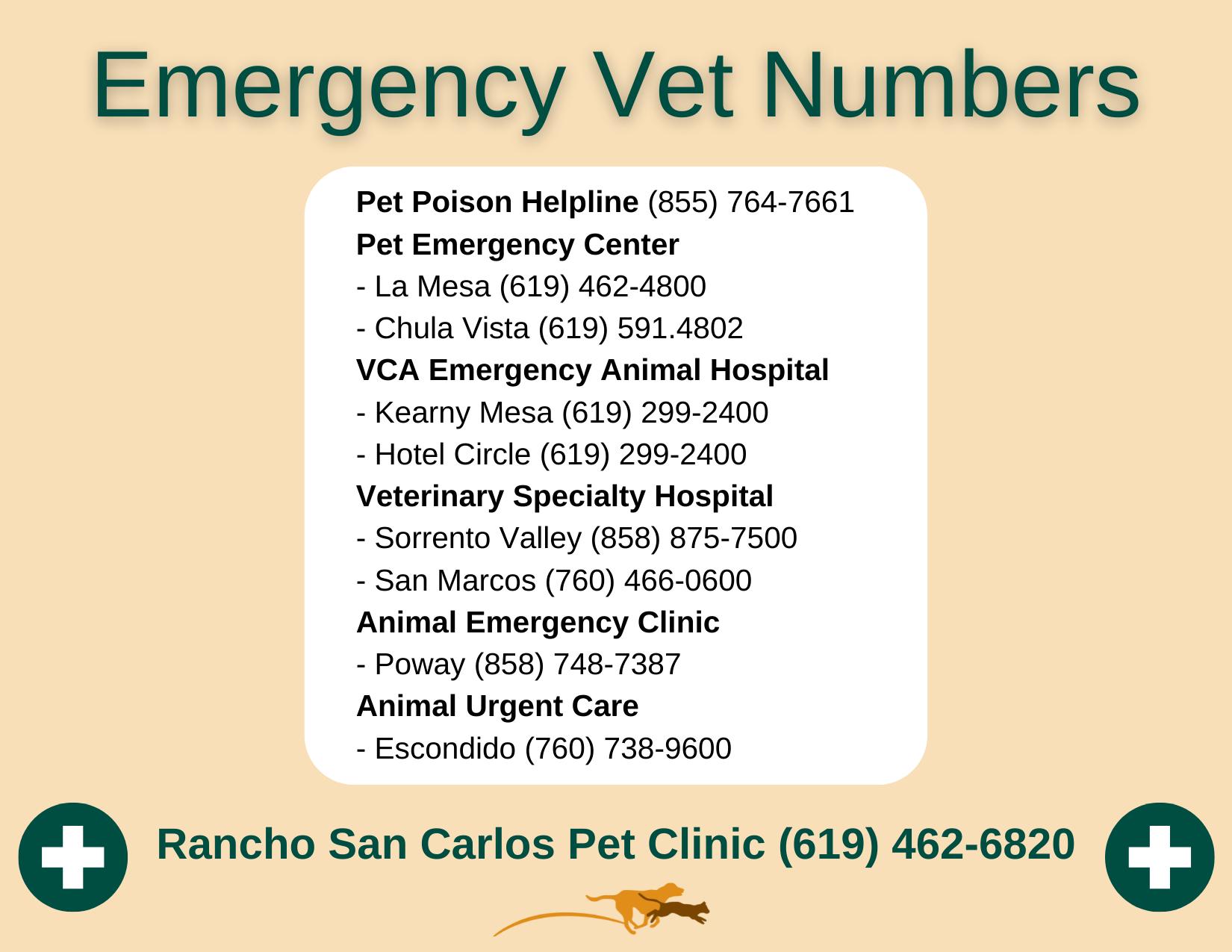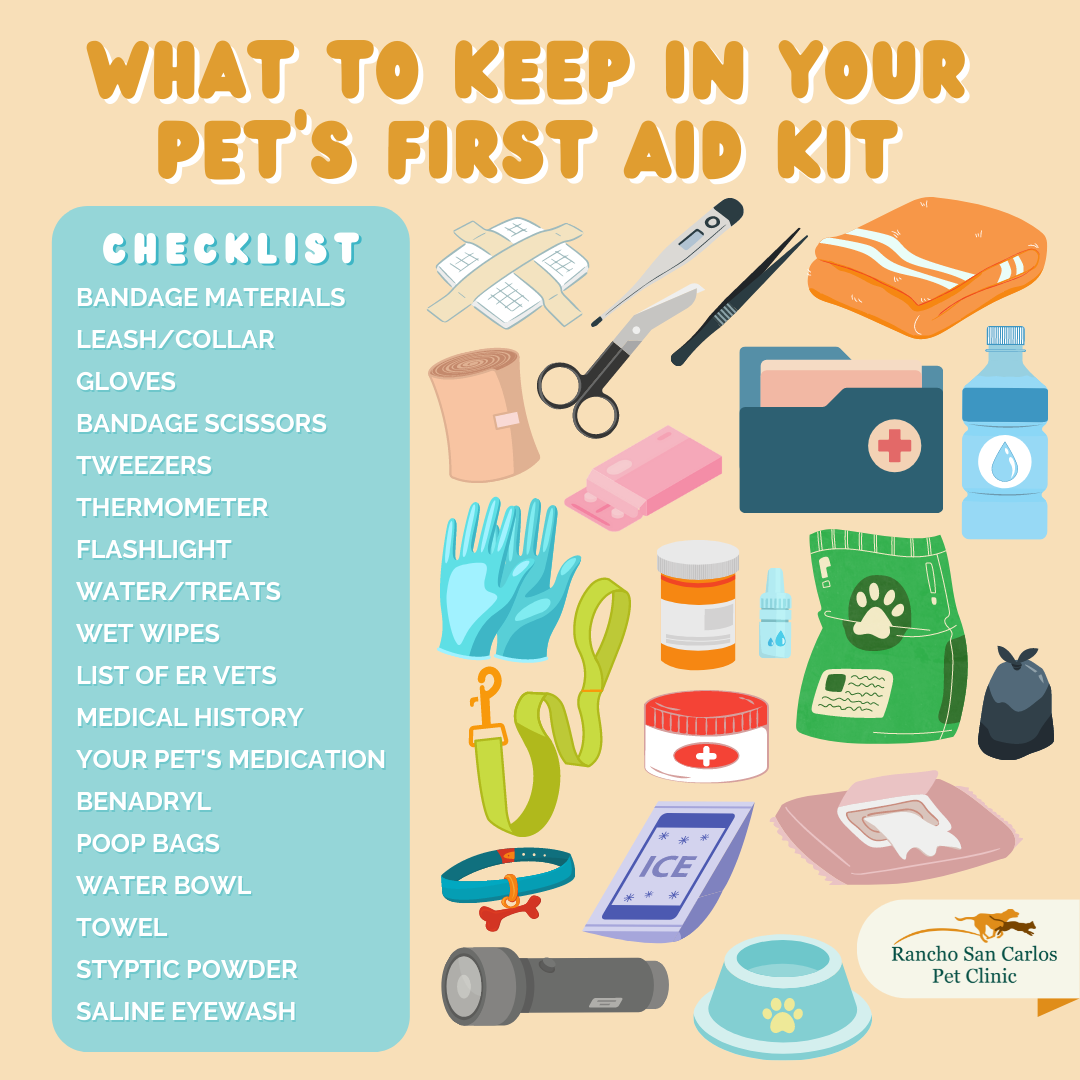Veterinary EmergencyResources
If you feel you have an emergency with your pet, please call us immediately.

Rancho San Carlos Pet Clinic Veterinary Emergency Resources
EMERGENCIES DURING OFFICE HOURS:
Our hospital uses scheduled appointments for veterinary visits. We do understand that medical issues and emergencies come up suddenly and you may need to have your pet seen right away. We save urgent appointments each day to help accommodate these instances and ask that we schedule your pet’s wellness visit in advance whenever possible. Our urgent appointments are only available for our current clients.
Please note that we are not an emergency hospital. Due to area shortages, we do not carry blood products. If your pet is having an urgent or emergency problem we do recommend going to Tell Tail Veterinary Urgent Care if they are open or one of the other hospitals listed below.
Please note: Critical Emergencies, Drop-Off Appointments, or other non-scheduled appointments, if we are able to accommodate them, do incur additional care fees. These vary with the type and nature of the visit. Our staff will attempt to make you aware of the fee when your pet is brought or called in.
IN THE EVENT WE CAN NOT SEE YOUR PET, WE CAN REFER YOU TO:
WEEKDAY DAYTIME EMERGENCIES
Tell Tail Veterinary Urgent Care
(Walk-ins Mon-Friday 8am-5pm)
10397 Friars Road,San Diego, CA 92120
(619) 282-8035
24 HOUR EMERGENCY FACILITIES
In the event of an after-hours emergency, please take your pet to the nearest emergency clinic listed below. The emergency veterinarian will be in touch with our doctors on the next business day.
Pet Emergency & Specialty Center, La Mesa (Open 24 Hours)
5232 Jackson Dr Suite 105, La Mesa, CA 91942
(619) 462-4800
VCA Animal Specialty Group, Kearny Mesa (Open 24 hours)
5610 Kearny Mesa Rd, San Diego, CA. 92111
(858) 560-8006
Veterinary Specialty Hospital, Sorrento Valley (Open 24 hours)
10435 Sorrento Valley Rd, San Diego, CA. 92121
(858) 875-7500
VCA Emergency Animal Hospital, Hotel Circle (Open 24 hours)
2317 Hotel Circle South, San Diego, CA 92108
(619) 299-2400
Animal Urgent Care, Escondido (Open 24 hours)
2430 S Escondido Blvd, Escondido, CA 92025
(760) 738-9600
Veterinary Specialty Hospital, North County (Open 24 hours)
2055 Montiel Rd, San Marcos, CA 92069
(760) 466-0600
Veterinary Emergency Group, Encinitas (Open 24 hours)
260 N El Camino Real, Encinitas, CA 92024
(760) 377-6611
Pet Emergency & Specialty Center, Chula Vista (Open 24 hours)
885 Canarios Court, Chula Vista, CA 91910
(619) 591-4802
ADDITIONAL URGENT CARE FACILITIES
San Diego Veterinary Urgent Care
(Open Fri. 5pm-12, Sat. 2pm-12pm, Sun. 12pm-10pm)
2860 University Ave, San Diego, CA 92104
(619) 977-1114
Animal Emergency Clinic of San Diego
(Open Fri 5pm-12am, Sat-Sun open 24 hours)
12775 Poway Road, Poway, CA 92064
(858) 748-7387
AVIAN & EXOTIC ANIMAL EMERGENCIES
Pet Emergency & Specialty Center
5232 Jackson Dr Suite 105, La Mesa, CA 91942
619-462-4800
WHAT TO DO DURING A VETERINARY EMERGENCY
Step 1: Remain Calm. This may be a scary, stressful, or painful event. In order to help your pet, please remain calm.
Step 2: Be Safe. If your pet is in pain, it may be scared and lash out. During a seizure or certain toxicities, your pet may bite without meaning to. Please get your pet to a safe location (off the couch, away from stairs, away from the pool). Do not put your hand or anything else near the mouth, and be careful to prevent injury when helping your pet. Large dogs can be placed on a blanket to be moved safely.
Step 3: Contact Help. Call us if we’re open or contact one of the facilities listed above, depending on your location.
Step 4: Do not give any medications unless directed.
Step 5: Bring your pet’s records. If it is reasonable to take the time to do so and have them at hand, bring any relevant records, including vaccine history, with you. Vaccine history is readily available for your pet using our app.
Step 6: Be prepared to wait. Emergency hospitals may have long wait times depending on what other critical cases are being handled at the same time. Please be patient with your staff and communicate your pet’s status if it changes at all.
INFORMATION FOR SPECIFIC EMERGENCIES:
Cardiac Arrest:
In the event that your pet is found non-responsive, please start traveling to the nearest emergency hospital. tel:619-462-6820 while on your way for specific instructions. If needed, here is a video on how to perform animal CPR.
Rattlesnake Bite (envenomation):
Go to the nearest veterinary hospital with antivenom for immediate treatment. We do carry antivenom but recommend you call first to ensure we have adequate staff to handle this emergency.
For Rattlesnake avoidance training classes, check out Natural Solutions or another class near you.
Trauma:
Accidents that involve a fall, a vehicle, or another animal can be some of the more scary emergencies. Please get yourself and your pet to a safe location (out of traffic, away from the attack, etc.).Then stabilize your pet with towels, a box, or another item to help transport them safely to the nearest emergency hospital. Apply direct pressure to any bleeding areas. Call while on your way for specific instructions.
Choking or respiratory distress:
Choking on a toy, ball, bone, or other items can be an immediate emergency. If you can easily dislodge the item, please do so. If not, and if your pet is having trouble breathing, please start traveling to the nearest emergency hospital. Call while on your way for specific instructions. If your pet is not in immediate danger but has swallowed an item, an urgent veterinary visit is recommended as these items can cause trauma to the esophagus and intestinal tract, become dislodged, or be toxic.
Bloat (Gastric Dilation & Volvulus, or GDV):
This condition occurs when the stomach fills with gas, then rotates or twists, putting pressure on the diaphragm and reducing blood supply to the stomach. The symptoms include drooling, gagging, a bloated abdomen, pain, and retching without vomiting. This condition requires emergency care and can be fatal. Start traveling to the nearest emergency hospital. Call while on your way for specific instructions.
Poisoning or Toxicities:
Time is very important in toxicities. Sometimes vomiting is important, sometimes charcoal or fluids, and sometimes there is an antidote. The treatment for each toxicity is different, which is why seeking professional help is so important. Call us or the nearest emergency facility. If possible, bring the package or label of the item so the doctor can know exactly what your pet ate.
We do not recommend inducing vomiting at home without the direct advice of a veterinarian.
You may also contact the Pet Poison Helpline at 855-764-7661 (for a fee).
Not sure if it’s toxic? A quick search with the ASPCA Animal Poison Control and Poisonous and Non-Poisonous Plants list may help.
PLANNING AHEAD FOR AN EMERGENCY
We know that it is impossible to plan for every occasion, but having an emergency plan is key to a quick response. This can be essential in a veterinary emergency but also a disaster evacuation.
An understanding of basic Pet First Aid (or a quick reference app or guide). To get some training on how to handle a veterinary emergency, consider getting a training course: Pet4CPR evening and weekend classes in San Diego. All of your pet’s emergency needs are in a convenient area of the home.
You can also take steps to prevent several common accidents and illnesses by implementing the following safety precautions:
- Stay up to date on vaccines recommended by your vet.
- Stay current on flea-tick and heartworm preventatives. Parasite prevention is needed year-round, especially in San Diego.
- When the temperature is over 65 degrees, do not leave your dog in a vehicle. Ever. The inside of the car will reach much higher temperatures rapidly, even when it is cool outside.
- Limit or avoid human foods, especially rich, fatty foods, which can cause stomach upset and even pancreatitis.
- Get to know common toxic plants and avoid planting them in the yard or bringing them indoors. If your pet wanders outside, be aware of what is in neighboring yards as well.
- Do not have lilies in a house with cats. All parts of the lily are toxic, including pollen and the water the cut flowers have been in.
- Treat your pet as you would a toddler by doing a sweep of all potentially dangerous items, such as medications and house cleaners. Keep these items out of reach.
- Indoor cats live longer and are at much less risk of trauma and disease than their outdoor counterparts.
- Keep your dog on a leash while walking, and ensure adequate training and socialization.


